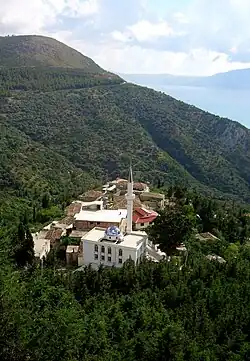Kaninë | |
|---|---|
 The mosque of Kaninë from above | |
.svg.png.webp) Kaninë | |
| Coordinates: 40°26′23″N 19°31′8″E / 40.43972°N 19.51889°E | |
| Country | |
| County | Vlorë |
| Municipality | Vlorë |
| Municipal unit | Qendër Vlorë |
| Time zone | UTC+1 (CET) |
| • Summer (DST) | UTC+2 (CEST) |
Kaninë is a settlement in the Vlorë County, southwestern Albania.[1] At the 2015 local government reform it became part of the municipality Vlorë.[2] It is home to the Kaninë Castle.
Name
The name of the fortified settlement of Kanina was attested for the first time at the beginning of the 11th century AD in Byzantine Greek as τὰ Κάνινα (in plural form). The toponym is significant for the history of the Albanian language since Kanina represents a toponym that shows no sign of the dialect phenomenon of rhotacism, which is explained by the fact that the settlement was recorded with the name Kanina in a period during which rhotacism in Albanian was no longer active for some time. On the other hand, the name of nearby Vlorë, attested earlier, was subject to the Albanian rhotacism.[3]
History
The settlement of Kaninë developed below a hilltop Kaninë Castle which overlooks the village. The first phase of the fort dates to the late 4th/early 3rd century BCE and is linked to the development of fortified sites in the region by Illyrian tribes.[4][5] Kaninë provided the main route of the Amantes to the sea.[6] The site of Kaninë has been proposed as a possible location for the unidentified ancient site of Thronium, alternatively the site of Triport has been proposed as a possible location for Thronium.[7] The stratigraphy of the site strongly indicate that the remains of the walls of the first phase were used for its rebuilding in late antiquity. Archaeological data coincide with the rebuilding efforts by Justinian in the 6th century CE. One of the forts which Procopius identifies as Kioni in Epirus Vetus may be a reference to Kanina.[8]
In the early Middle Ages, the site seems to have been abandoned and very little activity is archaeologically visible in its vicinity. Kanina and Vlora likely saw a revitalization by the 11th century. In this era, the rebuilt and expanded fortress of Kanina must have acquired an "increasingly defensive and administrative character" in the region.[9] In the 11th–12th centuries, Kanina (Greek: τὰ Κάνινα) along with Jericho (Oricum) and Aulon, it formed a Byzantine province.[10] As the Provincia Jericho et Caninon, it appears in the imperial chrysobull granted to Venice in 1198 by Alexios III Angelos.[10] In the 13th century it was part of the Despotate of Epirus, until Michael II Komnenos Doukas gave it as dowry to his daughter Helena Angelina Doukaina when she married King Manfred of Sicily in 1258.[10] In the decade of 1280 Kanina was contested between the Byzantine Empire and the Angevins. The contemporary poet Manuel Philis in his works recalls the campaign of protostrator Michael Glabas Tarchaneiotis.[11] It remained part of the Kingdom of Sicily thereafter, along with Aulon, until at least the 1330s.[12]
Notable people
- Donika Kastrioti
- Ismail Qemali,[13] diplomat, politician, statesman and Founding Father of Albania
- Zihni Kanina
See also
References
- ↑ "Location of Kaninë". Retrieved 22 April 2010.
- ↑ "Law nr. 115/2014" (PDF) (in Albanian). p. 6376. Retrieved 25 February 2022.
- ↑ Demiraj 2010, p. 79
- ↑ Komata 1974, p. 261.
- ↑ Zindel et al. 2018, p. 320.
- ↑ Çipa 2020, p. 216.
- ↑ Zindel et al. 2018, p. 346: "Diese Siedlungen... Thronion (Triport oder Kanina?)"
- ↑ Molla 2017, p. 209.
- ↑ Molla 2017, p. 215.
- 1 2 3 Zakythinos 1941, p. 219.
- ↑ Nicol, Donald M. (30 August 1984). The Despotate of Epiros 1267-1479: A Contribution to the History of Greece in the Middle Ages. Cambridge University Press. p. 98. ISBN 978-0-521-26190-6.
- ↑ Zakythinos 1941, pp. 219–220.
- ↑ Puto, Arben (2012). Pavarësia Shqiptare dhe Diplomacia e Fuqive të Mëdha : 1912-1914 (in Albanian) (Botim i ripunuar ed.). Tiranë: Botimet Toena. p. 545. ISBN 978-99943-1-826-1.
Arkivoli u mbulua me flamurin kombëtar, u çua në vendlindje në Kaninë dhe këtu u bë varrimi i parë.
Sources
- Çipa, Kriledjan (2020). "The fortified settlement of Borshi and its role in Chaonia fortification system". In Luigi Maria Caliò; Gian Michele Gerogiannis; Maria Kopsacheili (eds.). Fortificazioni e società nel Mediterraneo occidentale: Albania e Grecia settentrionale [Fortifications and Societies in the Western Mediterranean: Albania and Northern Greece]. Quasar. ISBN 9788854910430.
- Demiraj, Bardhyl (2010). "Gli insediamenti degli albanesi nell'alto medioevo" (PDF). In Gianni Belluscio; Antonino Mendicino (eds.). Scritti in onore di Eric Pratt Hamp per il suo 90 compleanno. Rende: Università della Calabria. pp. 73–83.
- Komata, Damian (1974). "La forteresse de Kaninë". Iliria. 9–10 (9–10).
- Molla, Nevila (2017). "The survival and revival of urban settlements in the southern Adriatic: Aulon and Kanina in the early to late Middle Ages". In Moreland, John; Mitchell, John; Bea, Leal (eds.). The survival and revival of urban settlements in the southern Adriatic: Aulon and Kanina in the early to late Middle Ages. Archaeopress. ISBN 178491682X.
- Puto, Arben (2012). Pavarësia Shqiptare dhe Diplomacia e Fuqive të Mëdha : 1912-1914 (in Albanian) (Botim i ripunuar ed.). Tiranë: Botimet Toena. p. 545. ISBN 978-99943-1-826-1.
- Zakythinos, Dionysios (1941). "Μελέται περὶ τῆς διοικητικῆς διαιρέσεως καὶ τῆς ἐπαρχιακῆς διοικήσεως ἐν τῷ Βυζαντινῷ κράτει" [Studies on the administrative division and provincial administration in the Byzantine state]. Ἐπετηρίς Ἐταιρείας Βυζαντινῶν Σπουδῶν (in Greek). 17: 208–274. hdl:11615/19494.
- Zindel, Christian; Lippert, Andreas; Lahi, Bashkim; Kiel, Machiel (2018). Albanien: Ein Archäologie- und Kunstführer von der Steinzeit bis ins 19. Jahrhundert (in German). Vandenhoeck & Ruprecht. ISBN 9783205200109.
